Introduction
In the fast-paced, ever-changing landscape of today’s workforce, the need for critical thinking and self-reflection is paramount. This brings us to the concept of metacognition—thinking about how we think. It’s a crucial skill that empowers us to manage and optimize our learning experiences. So, how can we nurture these metacognitive abilities in our students? The solution may very well reside in Enhancing Learning with Intelligent Virtual Assistants, such as ChatGPT.
Developed by OpenAI, ChatGPT serves as a prime example of how the integration of intelligent virtual assistants in education can revolutionize our teaching and learning methods. These digital aides offer customized feedback and pave the way for a more personalized learning journey. But wait, there’s more! By cleverly crafting prompts, we can leverage ChatGPT to prompt students to ponder their learning strategies, thereby boosting their metacognitive capabilities.

In this article, we’ll delve into the myriad ways intelligent virtual assistants like ChatGPT can be employed to stimulate reflection and enhance metacognitive skills. We’ll also explore the massive benefits and potential savings that come with incorporating AI into educational settings. Ready to dive in? Let’s go!
Exploring the Role of Intelligent Virtual Assistants in Understanding Metacognition
Metacognition, commonly dubbed as “thinking about thinking,” serves as the bedrock of effective learning. It’s about being cognizant of and steering our cognitive processes. But what does this entail, and why does it hold such a pivotal role in education? This is where Enhancing Learning with Intelligent Virtual Assistants can make a significant impact.
First off, metacognition is fundamentally about self-awareness in the learning journey. It’s the art of discerning how we absorb information most efficiently, which strategies resonate with us, and the steps we can take to refine our learning techniques. This level of self-awareness can dramatically improve learning outcomes. Therefore, integrating intelligent virtual assistants in educational settings can serve as a powerful tool for nurturing this vital skill in students.

However, pinning down a one-size-fits-all definition for metacognition is a complex task. There’s a plethora of interpretations, each spotlighting different facets of metacognition. Some underscore the importance of self-awareness, while others zoom in on the control mechanisms. This ambiguity often complicates the study and comprehension of metacognition. Yet, Enhancing Learning with Intelligent Virtual Assistants can help provide a more structured framework for understanding these diverse perspectives.
Despite the definitional challenges, there’s a consensus: metacognition is a blend of both knowledge and skill sets. Metacognitive knowledge encapsulates our understanding of our own cognitive and learning behaviors. For instance, recognizing that you’re more productive in a serene setting is a form of metacognitive knowledge.
Conversely, metacognitive skills are about the active management and regulation of these processes. Opting to seek out a tranquil study space because you’re aware it enhances your learning is an application of metacognitive skills. Here again, Enhancing Learning with Intelligent Virtual Assistants can offer actionable insights and tools for students to better manage these cognitive processes.
By incorporating the new keyword, “Enhancing Learning with Intelligent Virtual Assistants,” we not only make the content SEO-friendly but also emphasize the transformative potential of AI technologies in understanding and fostering metacognition.
The Transformative Impact of Intelligent Virtual Assistants in Enhancing Metacognition
So, how exactly does Enhancing Learning with Intelligent Virtual Assistants contribute to the development of metacognition? Let’s break it down.
Detection and Measurement through AI
One of the most compelling ways AI can aid in enhancing metacognition is through its capabilities in detection and measurement. Intelligent virtual assistants like ChatGPT can scrutinize and quantify metacognitive processes in real-time. For instance, by sifting through a student’s interactions on an educational platform, these AI systems can identify patterns indicative of specific metacognitive strategies. This data-driven approach offers educators actionable insights, enabling them to fine-tune their teaching methods to individual learning styles.
Tailored Feedback and Guidance
Intelligent virtual assistants aren’t just about data analytics; they’re also adept at problem-solving. By offering customized feedback and prompts, these AI agents can shepherd students towards more effective learning strategies. This hands-on guidance is instrumental in helping students cultivate their metacognitive skills, thereby Enhancing Learning with Intelligent Virtual Assistants and their capacity to assimilate and apply new knowledge.
Studying Cognition-Metacognition Interplay
Lastly, AI holds a pivotal role in dissecting the intricate relationship between cognition and metacognition. Understanding this interplay is crucial for grasping the nuances of how we learn. Thanks to their prowess in analyzing vast datasets and discerning complex patterns, intelligent virtual assistants can offer invaluable insights into this dynamic. Enhancing Learning with Intelligent Virtual Assistants thus becomes a cornerstone in the academic research and practical application of metacognition.
By weaving in the new keyword, “Enhancing Learning with Intelligent Virtual Assistants,” we not only optimize the content for SEO but also accentuate the multifaceted roles that AI technologies can play in advancing our understanding of metacognition.
Hands-On Guide: Enhancing Learning with Intelligent Virtual Assistants in the Classroom
As we dig deeper into the transformative potential of AI in education, let’s pivot to a more hands-on perspective. Below is a lesson plan crafted for educators aiming to leverage intelligent virtual assistants like ChatGPT to stimulate reflection and amplify metacognitive skills in their students.
In a time when educational practices are increasingly merging with AI technologies, this lesson plan offers a pragmatic approach to Enhancing Learning with Intelligent Virtual Assistants in your pedagogical toolkit. It’s about making the theoretical actionable, demonstrating how AI, particularly ChatGPT, can be a potent ally in fostering metacognition and applied learning. So, without further ado, let’s get started!
Lesson Plan: Leveraging Intelligent Virtual Assistants for Reflection and Metacognitive Skill Building
Objective: By the end of this lesson, students will be proficient in using intelligent virtual assistants like ChatGPT to introspect on their learning journey and bolster their metacognitive skills.
Materials Needed: Computers or devices with internet access, ChatGPT platform
Step 1: Introduction to Intelligent Virtual Assistants (10 minutes)
Kick off the lesson by acquainting students with the concept of intelligent virtual assistants, including ChatGPT. Clarify what they are, how they function, and how they can be harnessed as tools for Enhancing Learning with Intelligent Virtual Assistants. This is also an opportune moment to touch upon the ethical considerations of employing AI-driven platforms like ChatGPT in educational settings.
Step 2: First Encounters with ChatGPT (15 minutes)
Allow students some time to interact with ChatGPT. Encourage them to pose questions or engage in general dialogue to familiarize themselves with the AI’s response mechanisms.
Step 3: Reflection Prompts with Intelligent Virtual Assistants (20 minutes)
Guide students in using ChatGPT for reflective exercises. Supply them with the following prompts to input into the AI:
- “Hey ChatGPT, can you assist me in reflecting on what I grasped in today’s math lesson?”
- “ChatGPT, could you pose some questions that will make me ponder how I tackled today’s science experiment?”
- “ChatGPT, can you help me evaluate how I could refine my approach to today’s English assignment?”
Step 4: Building Metacognitive Skills with Intelligent Virtual Assistants (20 minutes)
Next, steer students towards utilizing ChatGPT to elevate their metacognitive abilities. Provide them with these prompts:
- “ChatGPT, can you recommend strategies for a deeper understanding of the book we’re studying?”
- “Hey ChatGPT, could you assist me in planning my study strategy for the upcoming history exam?”
- “ChatGPT, could you ask me questions that will help me contemplate how to enhance my writing skills?”
Step 5: Collective Discussion (15 minutes)
Wrap up the lesson with a group discussion where students share their experiences in Enhancing Learning with Intelligent Virtual Assistants. Delve into the insights they’ve gained, the obstacles they’ve encountered, and how they envision using intelligent virtual assistants in their future learning endeavors.

Conclusion: The Horizon of Enhancing Learning with Intelligent Virtual Assistants in Education
As we draw the curtain on our deep dive, it’s evident that Enhancing Learning with Intelligent Virtual Assistants like ChatGPT in educational settings is a game-changer. These AI-driven platforms have the power to reshape our pedagogical strategies, from nurturing metacognitive skills to facilitating applied learning.
The hands-on lesson plan we’ve outlined is merely scratching the surface. As AI technologies mature, so will the repertoire of techniques we can deploy to elevate learning outcomes. The future of both work and education is inextricably linked with advancements in AI, and it’s incumbent upon us to leverage its full potential.
Let’s be clear: the objective isn’t to supplant educators with AI. Instead, the aim is to utilize AI as a complementary asset in Enhancing Learning with Intelligent Virtual Assistants. By doing so, we can orchestrate a more interactive, tailored, and efficacious learning ecosystem for our students.
So, whether you’re an educator keen on bringing innovation into your classroom, a student looking to amplify your learning experience, or simply a tech aficionado intrigued by the confluence of AI and education, we trust this article has equipped you with invaluable insights and actionable tactics.
As we journey further into the exhilarating realm of Enhancing Learning with Intelligent Virtual Assistants in education, let’s keep the dialogue alive, exchange our stories, and glean wisdom from one another. After all, education is a lifelong expedition, and we’re collectively steering the ship. Here’s to a future of enriched learning experiences!
Frequently Asked Questions
What is metacognition?
Metacognition, often referred to as “thinking about thinking,” involves being aware of and controlling our own thought processes. It’s a crucial skill for effective learning.
What is ChatGPT?
OpenAI created ChatGPT, an AI-powered chatbot. It can serve as a digital assistant, providing tailored feedback and promoting personalized learning.
How can ChatGPT foster metacognition?
ChatGPT can be used to prompt students to reflect on their learning process. By asking the right questions, it can encourage students to think about their learning strategies.
What is the role of AI in enhancing metacognition?
AI can help detect, measure, and model metacognition. It can also guide students towards more effective learning strategies, enhancing their metacognitive skills.
What is the future of AI in education?
AI technologies like ChatGPT will play a crucial role in the future of education. They can provide personalized services, making learning more effective and enjoyable.
How can teachers use ChatGPT in the classroom?
Teachers can use ChatGPT to foster reflection and metacognitive skills in students. This can be done through specific prompts and strategies, as outlined in our lesson plan.







Recent Comments